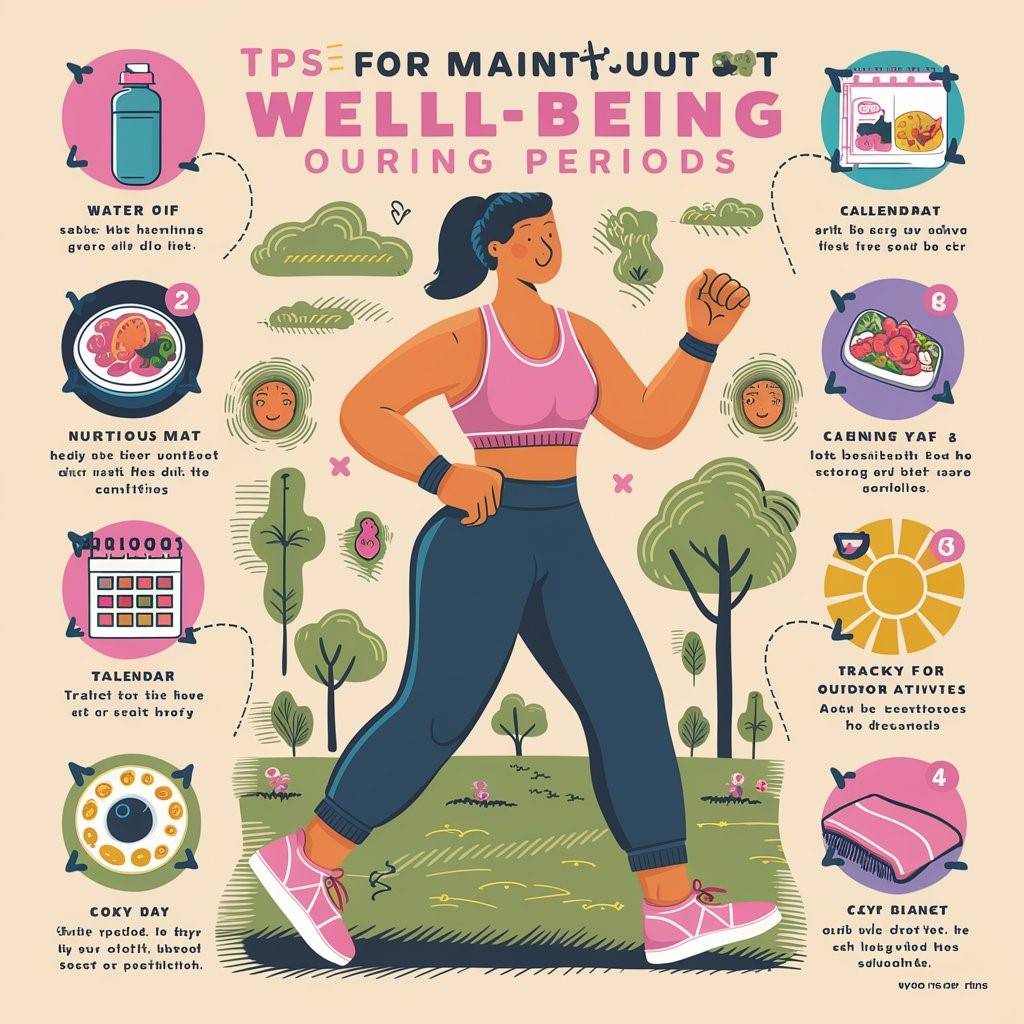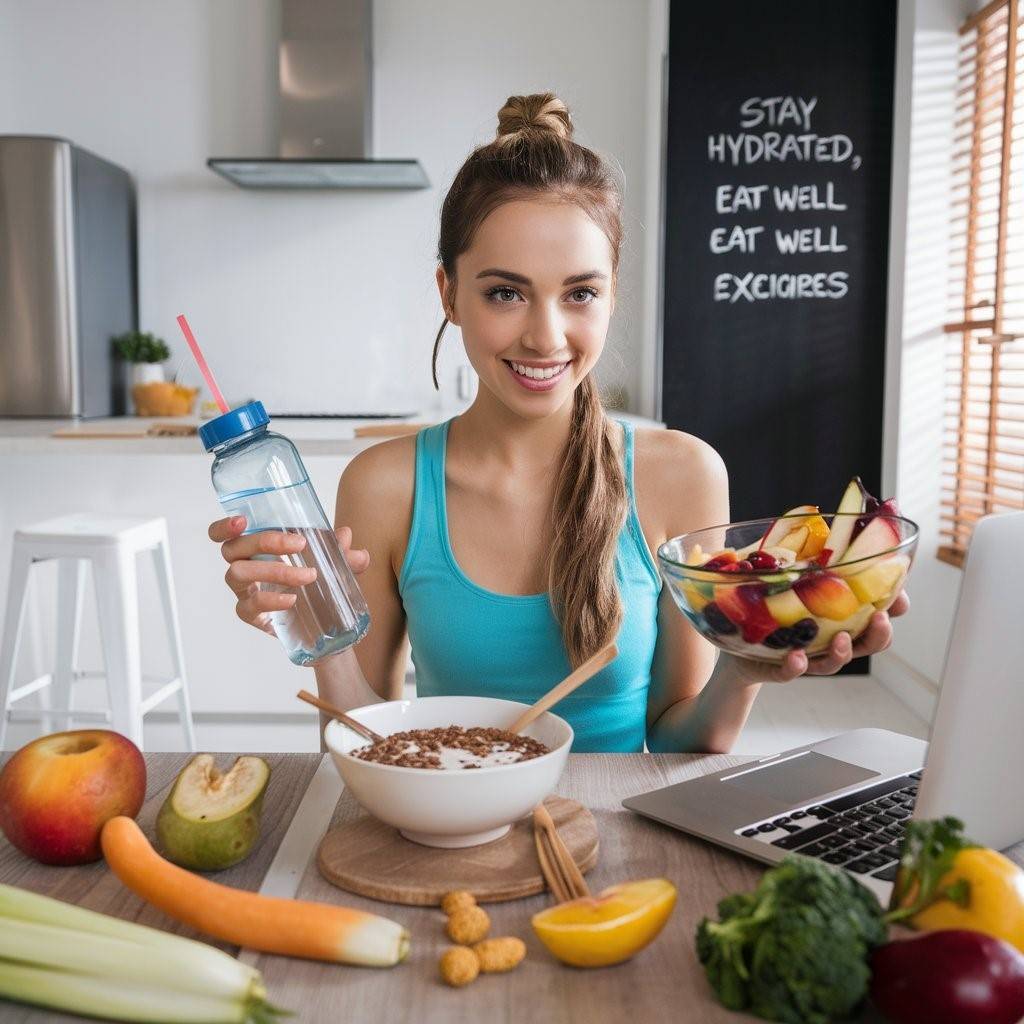How to Stay Healthy During Periods: Essential Tips for Well-Being
Discover essential tips for maintaining well-being during periods. Learn How to Stay Healthy During Periods Cycle.
Understanding Your Menstrual Cycle
How to Stay Healthy During Periods: Navigating your monthly period can pose challenges, but it’s vital to prioritize your well-being. Each woman’s menstrual cycle is distinct, with diverse symptoms and sensations. Some may encounter severe cramps, mood swings, fatigue, or other discomforts. Understanding your body’s needs and crafting strategies to stay healthy during this phase is crucial.
How to Stay Healthy During Periods: Best Tips

Staying Hydrated for Period Health
One of the most important tips for how to stay healthy during periods is to stay hydrated. During your menstrual cycle, your body loses additional fluids, which can lead to dehydration if not properly replenished. Aim to drink at least 8 glasses of water daily and consider adding hydrating fruits and vegetables to your diet, such as watermelon, cucumbers, and berries.
Avoid excessive consumption of caffeine and alcohol, as these beverages can contribute to dehydration and exacerbate menstrual symptoms like cramps and fatigue.
Nourishing Your Body with Nutrient-Rich Foods
Proper nutrition is key to how to stay healthy during periods. Your body requires a balanced intake of essential nutrients to function optimally and alleviate menstrual discomforts. Focus on incorporating the following nutrient-rich foods into your diet:
Fruits and Vegetables
- Rich in vitamins, minerals, and antioxidants
- Help reduce inflammation and bloating.
- Examples: leafy greens, citrus fruits, berries, avocados
Whole Grains
- Provide complex carbohydrates for sustained energy.
- High in fiber to support digestion.
- Examples: brown rice, quinoa, whole wheat bread
Lean Protein
- Aids in muscle recovery and tissue repair
- Sources: lean meats, eggs, legumes, nuts, and seeds
Iron-Rich Foods
- Combat iron loss during menstruation.
- Sources: red meat, spinach, lentils, fortified cereals
Avoid processed and sugary foods, as they can contribute to inflammation, mood swings, and energy fluctuations during your period.
Managing Menstrual Cramps
How to Stay Healthy During Periods: Menstrual cramps can disrupt daily life. Here’s how to manage them effectively. consider the following strategies:
- Heating Pads or Hot Water Bottles: Apply warmth to your lower abdomen to soothe muscle contractions and alleviate pain.
- Exercise: Engage in light to moderate physical activity, such as walking, yoga, or stretching, to release endorphins and improve blood flow.
- Over-the-counter pain Medication: Consult with your healthcare provider about safe and effective options like ibuprofen or acetaminophen.
- Massage: Gently massage the lower abdomen and lower back to relax tense muscles.
- Herbal Remedies: Some women find relief with herbal supplements like ginger, cramp bark, or chamomile tea, but consult a professional before trying new remedies.
Getting Enough rest.
Fatigue is a common symptom during menstruation, and getting enough rest is crucial for how to stay healthy during periods. Aim for 7-9 hours of quality sleep per night to allow your body to recharge and recover. Additionally, make time for relaxing activities like:
- Gentle yoga or meditation
- Reading a book or listening to calming music
- Taking a warm bath with Epsom salts
- Practicing deep breathing exercises
Prioritizing self-care and stress management can help alleviate menstrual-related mood swings, anxiety, and irritability.
Table: Common Menstrual Symptoms and Potential Relief Strategies
| Symptom | Potential Relief Strategies |
| Cramps | Heating pads, exercise, pain medication |
| Fatigue | Adequate rest, relaxation techniques |
| Mood Swings | Stress management, counselling |
| Bloating | Hydration, dietary fiber, exercise |
| Headaches | Pain medication, relaxation techniques |
| Heavy Flow | Iron-rich foods, hormonal birth control (consult a doctor) |
Engaging in Light Exercise
While strenuous exercise may not be appealing during your period, engaging in light physical activity can be beneficial for how to stay healthy during periods. Low-impact exercises like walking, swimming, or gentle yoga can help:
- Reduce menstrual cramps by increasing blood flow.
- Boost endorphin levels to improve mood.
- Alleviate stress and tension.
- Promote better sleep quality.
However, it’s important to listen to your body and avoid overexerting yourself, as this can lead to further fatigue and discomfort.
List: Examples of Light Exercise During Your Period
- Walking or light hiking
- Gentle yoga or stretching
- Low-impact aerobics or dancing
- Swimming or water aerobics
- Light weightlifting or resistance training
Practicing Stress Management Techniques
Menstrual cycles can be a source of stress and anxiety for many women, making stress management an essential aspect of how to stay healthy during periods. Elevated stress levels can exacerbate menstrual symptoms and negatively impact overall well-being. Consider incorporating the following stress-relieving techniques:
- Mindfulness meditation or deep breathing exercises
- Journaling or expressing emotions through creative outlets.
- Seeking support from friends, family, or a counsellor
- Engaging in enjoyable hobbies or leisure activities
- Practicing progressive muscle relaxation or guided imagery
By prioritizing stress management, you can cultivate a sense of calm and better cope with the physical and emotional challenges of your menstrual cycle.
Seeking Professional Support When Needed
While menstrual discomforts are common, severe, or persistent symptoms may indicate an underlying condition that requires medical attention. Don’t hesitate to consult with a healthcare professional if you experience:
- Extremely heavy or prolonged bleeding
- Severe menstrual cramps that interfere with daily activities
- Irregular or missed periods.
- Persistent mood changes or emotional distress
A healthcare provider can evaluate your symptoms, provide personalized guidance, and recommend appropriate treatment options or lifestyle modifications to help you manage your menstrual health effectively.
FAQs about How to Stay Healthy During Periods
Q: How do you stay healthy during your period?
A: To stay healthy during your period, it’s important to:
- Stay hydrated by drinking plenty of water and avoiding excessive caffeine and alcohol.
- Eat a nutrient-rich diet with fruits, vegetables, whole grains, lean protein, and iron-rich foods.
- Manage cramps with heating pads, exercise, over-the-counter pain medication, and massage.
- Get enough rest and engage in relaxing activities like yoga, meditation, or warm baths.
- Practice stress management techniques like deep breathing, journaling, or seeking support.
Q: What things should be avoided during periods?
A: During your period, it’s best to avoid or limit the following:
- Caffeine and alcohol, can contribute to dehydration, cramps, and mood swings.
- Processed and sugary foods, may increase inflammation, bloating, and energy fluctuations.
- Strenuous exercise may exacerbate fatigue or discomfort. Opt for light to moderate activities instead.
- Smoking or exposure to secondhand smoke, which can worsen menstrual cramps and other symptoms.
- Stress and anxiety, as can amplify physical and emotional menstrual symptoms. Practice relaxation techniques.
Q: Which fruit is best during periods?
A: Some of the best fruits to consume during your period include:
- Watermelon: High in water content to support hydration and rich in vitamins A, B6, and C.
- Blueberries: Packed with antioxidants and anti-inflammatory compounds to ease cramps and bloating.
- Pineapple: Contains bromelain, an enzyme that can help reduce inflammation and swelling.
- Oranges and other citrus fruits: Rich in vitamin C to support immune function and iron absorption.
- Bananas: Provide potassium, which can help regulate fluid balance and alleviate menstrual cramps.
Q: What foods are good for your period?
A: During your period, it’s beneficial to focus on nutrient-dense foods that can help alleviate symptoms and support overall health. Some good options include:
- Leafy greens like spinach and kale, are rich in iron, magnesium, and anti-inflammatory compounds.
- Whole grains like brown rice, quinoa, and oats, provide complex carbohydrates for sustained energy.
- Lean protein sources like chicken, fish, lentils, and tofu, aid in muscle recovery and tissue repair.
- Yogurt and other dairy products are fortified with calcium and vitamin D for bone health.
- Nuts and seeds like almonds, walnuts, and chia seeds, offer healthy fats, protein, and fiber.
- Herbal teas like ginger, chamomile, or raspberry leaf tea, may help soothe cramps and promote relaxation.
Remember, staying hydrated by drinking plenty of water is also crucial during your period.
Conclusion
Staying healthy during periods is crucial for maintaining overall well-being throughout your menstrual cycle. By following these essential tips, such as staying hydrated, nourishing your body with nutrient-rich foods, managing cramps effectively, getting enough rest, engaging in light exercise, practicing stress management techniques, and seeking professional support when needed, you can navigate your periods with greater ease and comfort.
Remember, every woman’s experience is unique, and it may take some trial and error to find the strategies that work best for you. Be patient, listen to your body’s needs, and prioritize self-care during this time. With the right approach, you can embrace your menstrual cycle as a natural part of your journey towards optimal health and well-being.



